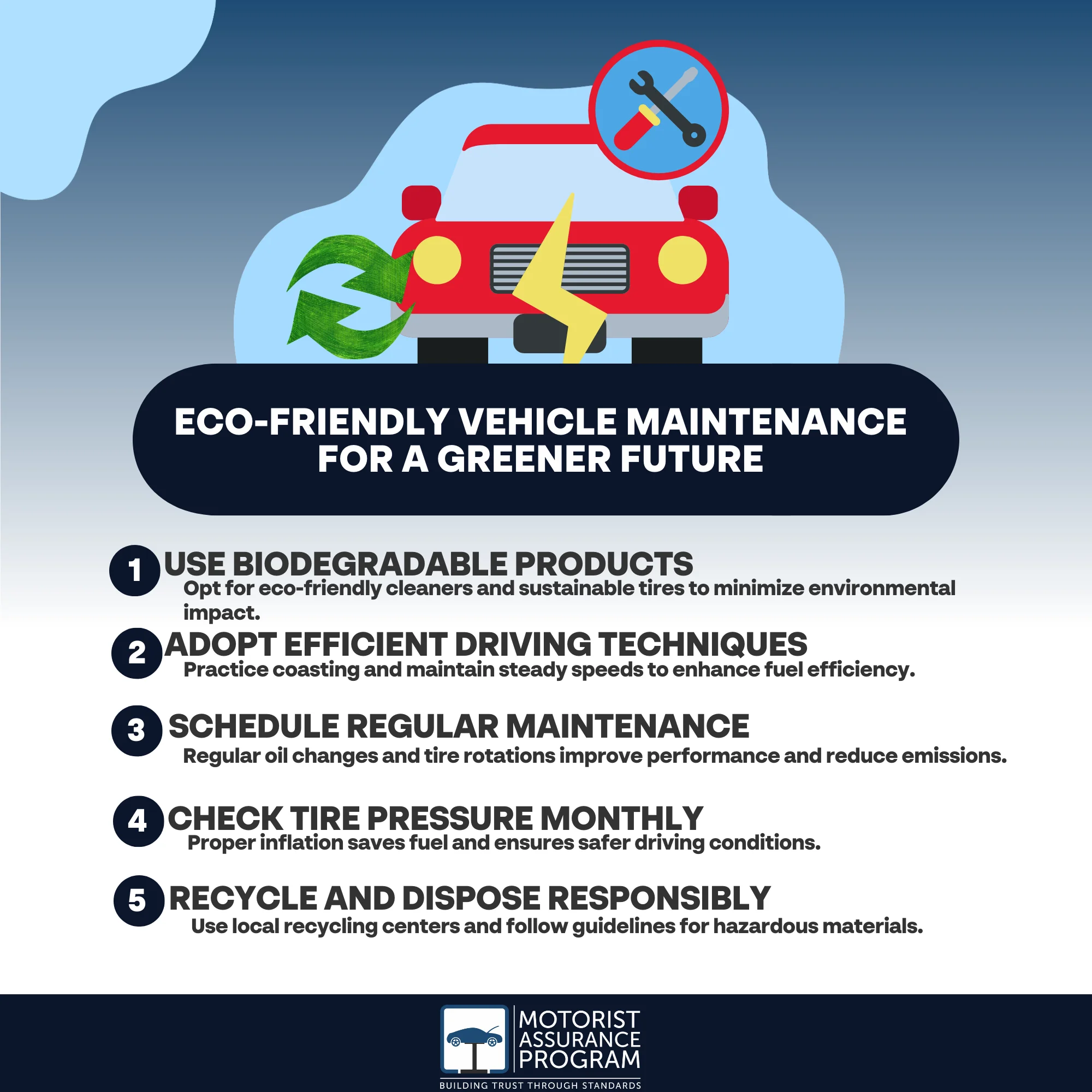Sustainable vehicle maintenance is your key to reducing environmental impact while maximizing your car’s performance. Start by using eco-friendly products, like biodegradable cleaners and sustainable tires, which help minimize your carbon footprint. Regular maintenance is essential; make sure to check your tire pressure monthly, change your oil every 3,000 to 5,000 miles, and rotate your tires regularly. Adopting efficient driving techniques, such as coasting and maintaining a steady speed, can greatly enhance fuel efficiency. Don’t forget about proper recycling and disposal of hazardous materials like batteries and oil. Keep going to discover more tips for a sustainable driving experience!

Key Takeaways
-
Choose biodegradable cleaners and sustainable products to protect ecosystems and enhance vehicle performance.
-
Follow efficient driving techniques like coasting and maintaining a steady speed to improve fuel economy.
-
Schedule regular maintenance, including oil changes and tire rotations, to extend vehicle life and efficiency.
-
Regularly check tire pressure and inspect brakes, lights, and wipers to prevent major issues and enhance safety.
-
Dispose of hazardous materials responsibly by using local recycling centers and following proper disposal regulations.
Importance of Eco-Friendly Practices
In today’s world, embracing eco-friendly practices in vehicle maintenance isn’t just a trend—it’s a necessity. By prioritizing sustainable methods, you actively contribute to reducing your carbon footprint. Each time you choose renewable resources for your vehicle, you’re making a statement about your commitment to the environment, as highlighted by various resources on fuel economy ratings.
Using eco-friendly oils, filters, and cleaning products not only protects the planet but also enhances your vehicle’s performance. When you opt for products made from renewable resources, you’re helping to minimize the depletion of our natural environment. This choice reflects a conscious decision to protect our ecosystems for future generations.
Adopting eco-friendly practices in your vehicle maintenance routine can lead to cost savings over time. Regularly maintaining your car guarantees it runs efficiently, which often translates to better fuel economy. When your vehicle consumes less fuel, it not only benefits your wallet but also reduces harmful emissions.
Choosing Sustainable Products
Sustainable products are the backbone of eco-friendly vehicle maintenance, making your choices essential for both your car’s health and the environment. When selecting cleaning supplies, opt for biodegradable cleaners that break down naturally and reduce harmful chemical runoff.
These products not only keep your vehicle looking great but also protect local ecosystems from toxic substances. Using sustainable cleaning products also contributes to the overall reduction of emissions associated with vehicle maintenance, aligning with the benefits of electric vehicles’ environmental impact.
Next, consider your tires. Sustainable tires are designed with eco-friendly materials and processes, which can help minimize your vehicle’s carbon footprint.
They often feature lower rolling resistance, improving fuel efficiency while maintaining safety and performance. Investing in sustainable tires means you’re making a long-term commitment to both your vehicle’s performance and the planet’s well-being.
Efficient Driving Techniques
Driving efficiently can greatly reduce your vehicle’s fuel consumption and emissions. By adopting some simple techniques, you’ll not only save money at the pump but also contribute to a healthier planet.
One effective method is using coasting techniques. When you anticipate a stop or slow down, ease off the accelerator and let your vehicle coast. This helps improve engine efficiency and reduces unnecessary fuel consumption.
Here are some tips to help you drive more efficiently:
-
Maintain a steady speed: Use cruise control on highways to avoid fluctuating speeds, which can waste fuel.
-
Avoid rapid acceleration: Gradually increase your speed to improve fuel efficiency and reduce strain on your engine.
-
Limit idling: Turn off your engine when parked or waiting for extended periods, as idling consumes fuel without moving you anywhere.
-
Plan your routes: Choose the most direct and least congested paths to minimize driving time and fuel use.
Regular Maintenance Tips
Maintaining your vehicle regularly is just as important as adopting efficient driving techniques. By keeping up with routine maintenance, you not only extend the life of your vehicle but also enhance its fuel efficiency.
Start with regular oil changes; changing your oil every 3,000 to 5,000 miles helps keep the engine running smoothly. Fresh oil reduces friction and wear, which is vital for peak performance.
Next, don’t overlook tire rotation. Rotating your tires every 5,000 to 7,500 miles guarantees even wear and prolongs their lifespan. This simple step can enhance traction and improve handling, making your ride safer and more enjoyable.
Check your tire pressure monthly. Properly inflated tires improve fuel efficiency and can save you money at the pump.
Remember to also inspect your brakes, lights, and windshield wipers regularly. Addressing small issues before they become major problems can save you time and money in the long run.
Recycling and Disposal Guidelines
Proper disposal of vehicle materials is essential for minimizing environmental impact. When you’re done with maintenance, knowing how to dispose of or recycle materials can greatly help protect our planet.
Here are some key points to remember:
-
Use recycling centers: Many parts, such as batteries and tires, can be recycled. Look for local recycling centers that accept these items.
-
Identify hazardous waste: Items like oil, brake fluid, and antifreeze are considered hazardous. Never throw them in the trash; they require special handling.
-
Follow local guidelines: Each area has different regulations for disposal and recycling. Check with your local waste management for specific instructions.
-
Educate yourself: Stay informed about what can and can’t be recycled. This knowledge helps you make better choices and reduces waste.
Frequently Asked Questions
How Does Vehicle Maintenance Impact Overall Environmental Sustainability?
Vehicle maintenance greatly impacts environmental sustainability by reducing your carbon footprint and promoting resource conservation. Regular servicing keeps your vehicle efficient, minimizing emissions and extending its lifespan, which ultimately benefits the planet and your wallet.
Can Electric Vehicles Be Maintained Sustainably?
Yes, you can maintain electric vehicles sustainably. By adopting sustainable driving habits and regularly servicing your EV, you enhance electric vehicle longevity, reduce waste, and contribute to a cleaner environment while enjoying efficient, eco-friendly transportation.
What Are the Benefits of Using Bio-Based Lubricants?
Using bio-based lubricants offers numerous advantages. You’ll find they reduce environmental impact and enhance equipment longevity. Plus, these lubricant alternatives can improve efficiency, leading to cost savings while supporting a healthier planet for future generations.
How Can I Find Local Eco-Friendly Repair Shops?
You can find local eco-friendly repair shops by searching repair shop directories and looking for green certifications. Check reviews to guarantee they align with your sustainable values.
Are There Certifications for Sustainable Vehicle Maintenance Practices?
Yes, there are certification programs for sustainable vehicle maintenance practices that meet industry standards. Look for shops with certifications like ASE or Green Business Bureau, ensuring they adhere to eco-friendly practices in their services.
Conclusion
By embracing sustainable vehicle maintenance, you’re not just caring for your car—you’re nurturing the planet, too. Each eco-friendly choice you make reflects a commitment to both your vehicle’s longevity and the environment’s well-being. So, rev up your engine with confidence, knowing that every small step contributes to a larger journey toward sustainability. Together, let’s drive change for a healthier planet.


